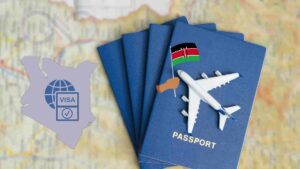Planning a trip to Kenya? Whether it is a safari in the wild or relaxing on the sandy beaches along the coast, you need to be well prepared.
Understanding travel requirements to Kenya and the entry requirements to Kenya is essential for a smooth and stress-free journey.
This Naicef guide helps you plan your getaway to Kenya, from entry requirements into Kenya to the travel to Kenya health requirements.
For more details on travel to Kenya required vaccinations, contact Naicef on my@naicef.com, call us on +254799922277 or simply;
Book Any Tour Here
Did you know that just a single missing document could stop your trip before it even starts?
This Naicef guide walks you through every essential step so you can breeze through the entry process and enjoy the magic of Kenya.
Travel Requirements To Kenya
More often, when traveling to Kenya from abroad, one needs to know the travel requirements to Kenya.
Picture this: the golden savannah stretching out before you, elephants grazing in the distance, and the call of exotic birds overhead.
Kenya promises adventure, beauty, and unforgettable memories.
Some of the packages to enjoy on your visit to Kenya by Naicef include;
- 6 Days Kenya Safari Tour Package
- 3 Days Mara Amboseli Hot Air Balloon Safari
- 3 Days Tsavo National Park Packages
But before your safari, beach getaway, or city escape begins, there’s one important journey you must complete: navigating Kenya’s entry requirements.
These entry requirements to Kenya include;
1. Passport
A passport that is valid for at least six months after the date you enter Kenya.
Ever missed a trip due to a blank page? Let’s avoid that. Ensure to have at least two blank pages for entry and exit stamps.
Damaged or missing pages can result in denied entry, so check them before you travel.
Safety tip: Keep a scanned copy of your passport in your email or cloud storage in case it’s lost or stolen during your trip.
A digital passport-sized photograph is also essential during your travel.

2. Electronic Travel Authorization (eTA)
The traditional Kenyan visa has been recently replaced with an Electronic Travel Authorization (eTA) process.
Most foreign nationals, whether tourists, business visitors, or transit passengers, require an eTA before coming to Kenya.
Most African countries have been exempted from the eTA, specifically citizens of the East African Community member states.
Libyan and Somali citizens, however, still require an eTA to travel to Kenya.
The application process is done online through the Kenya Immigration eTA Portal and is done at least two weeks in advance to avoid delays.
Make sure to have a printed copy of your eTA approval, as some airlines ask for it at check-in.
3. Proof of Onward or Return Ticket and Accommodation
Immigration and airlines will need proof of your leaving the country so as to ensure you do not stay over the permitted duration.
It is important as it shows compliance with immigration laws and helps authorities control the flow of people in and out of the country.
The accommodation needs to be confirmed during your stay period.
This can be a hotel booking, tour package details, or a letter from your host with their contact information.
Even if you’re staying with friends or family, having a written confirmation helps avoid lengthy border interviews.
4. Travel to Kenya Health Requirements
The travel to Kenya required vaccinations include;
- Yellow Fever
A yellow fever vaccination certificate is required if you’re arriving from or have transited through a country with a risk of yellow fever transmission.
It is advisable to consult with your doctor or a travel health professional to determine if this applies to you.
- COVID-19
Requirements may include proof of vaccination or a negative PCR test, but these change often. Always check the Kenya Airways travel updates before you fly.
Travelers under 18 years of age are exempt from COVID-19 vaccination requirements.
It is recommended to be up-to-date on all routine vaccinations. Other recommended vaccinations may include those for malaria, polio, and Hepatitis.
Ensure to consult a medical professional well in advance of your trip.
Keep vaccination cards safe, as losing your yellow fever certificate could mean being denied entry or paying for a new jab at the airport.

5. Customs & Prohibited Items
There is a need to declare at customs any cash above USD 10,000, plants, animal products, and certain electronics.
Plastic bags that include duty-free are prohibited and subject to heavy fines as Kenya has banned plastic bags. Ensure to dispose of them at the airport before entry.
Any drones require prior approval from the Kenya Civil Aviation Authority.
Bring reusable cloth bags for shopping, as Kenya is strict on plastic bans.
Proof of sufficient funds while staying in Kenya and the purpose of visit are other entry requirements to Kenya.
Safety Tips For Travelling To Kenya
Exercise a high degree of caution due to risks of crime, terrorism, and civil unrest.
Be aware of your surroundings, especially in crowded areas. It is advisable to avoid walking at night, to keep valuables out of sight, and to secure your accommodation.
Be wary of scams and people impersonating police officers.
For health concerns, ensure to take only sealed bottle water, avoid tap water, and raw foods unless peeled yourself.
Some people might spike your drinks and food and rob you, so be cautious of strangers.
Quick Pre-Travel Checklist
- Passport valid for 6+ months with 2 blank pages
- eTA approval (apply 2 weeks before)
- Printed onward/return ticket & accommodation details
- Yellow fever certificate (if applicable)
- COVID-19 test or proof of vaccination (check latest rules)
- Proof of funds (bank statement or cash)
- No prohibited items, especially plastic bags or unapproved drones
Conclusion
In conclusion, travel requirements to Kenya range from a number of things, from passports to health requirements.
The entry requirements to Kenya are straightforward once you know what to expect.
With your documents in order, you’ll spend less time at the airport and more time experiencing the magic of the Maasai Mara, the turquoise waters of Diani Beach, or the bustling streets of Nairobi.
Entry requirements into Kenya include the travel to Kenya health requirements and travel to Kenya required vaccinations.
For the latest updates, always double-check official sources such as:
- Kenya Immigration eTA
- Kenya eCitizen Visa Info
- UK Kenya Travel Advice
- S. State Department Travel Info
For more details, reach out to Naicef by emailing my@naicef.com, calling +254799922277, or just,
Book Any Tour Here
Frequently Asked Questions
1. Do I need a visa to visit Kenya?
Most visitors require an Electronic Travel Authorization (eTA), which must be obtained online before traveling and only a few countries are exempt. The Kenya Immigration site has the updated list.
2. How far in advance should I apply for an eTA?
It’s best to apply at least 2 weeks before travel. Processing usually takes 3–5 working days, but delays can happen during busy seasons.
3. How long can I stay in Kenya on a tourist entry?
Most tourist entries allow up to 90 days from the date of arrival. Extensions can be applied for online before your stay expires.
4. What happens if I overstay my allowed time in Kenya?
Overstaying is an immigration offense and can lead to fines, detention, or future travel bans. Always leave before your permitted stay ends.
5. Do I need a yellow fever vaccination to enter Kenya?
Yes. If you’re arriving from or have transited through a yellow fever risk country. Keep your yellow fever certificate handy for inspection.




